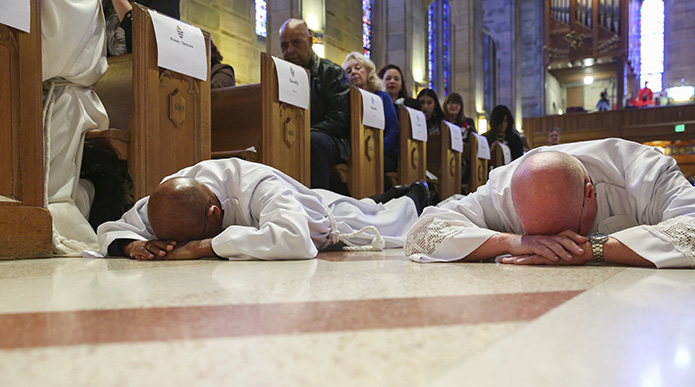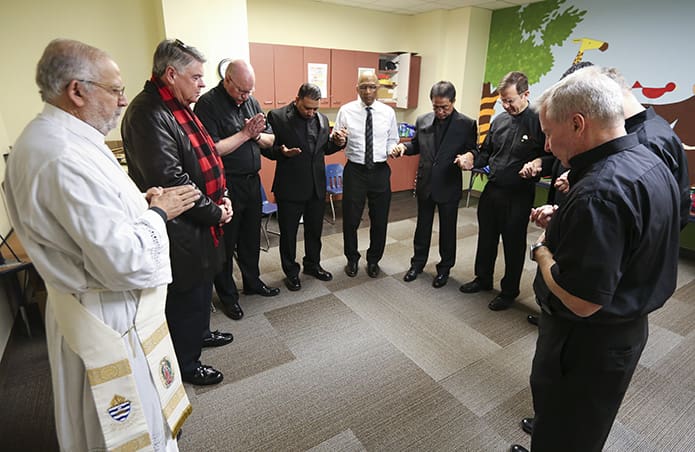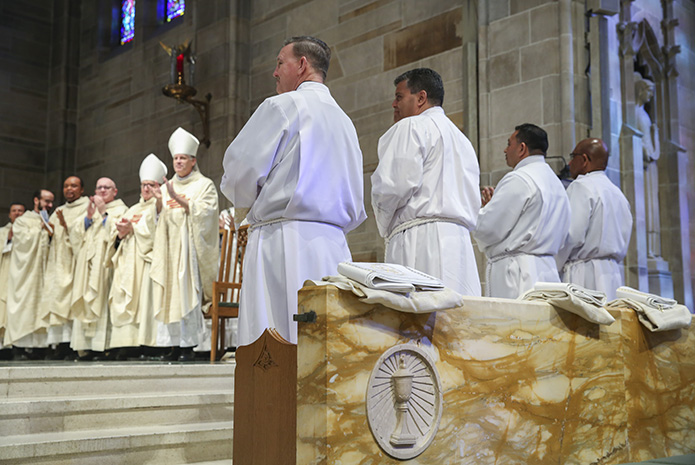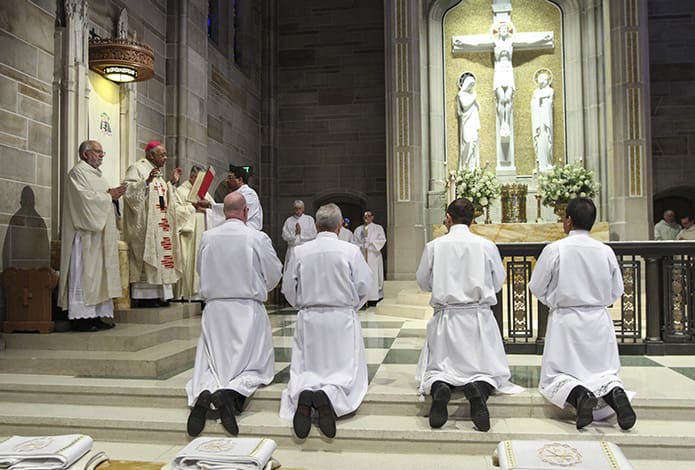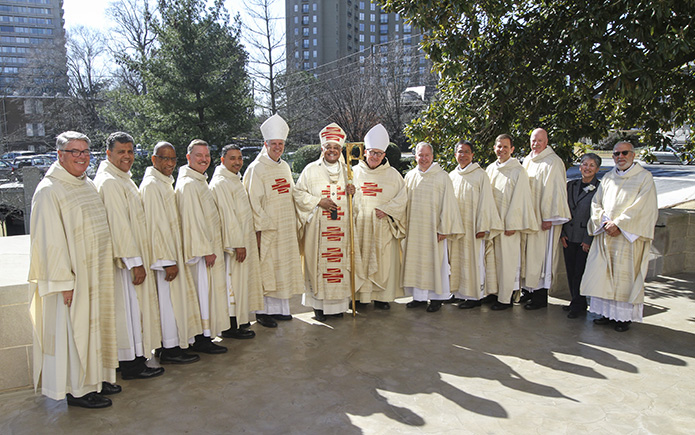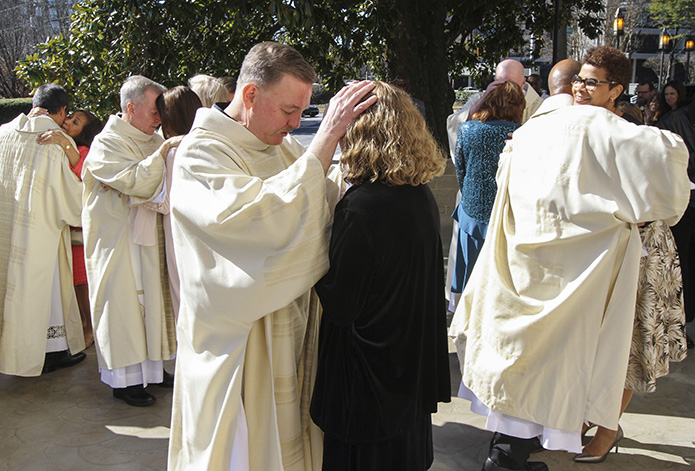Nicholas Goodly, left, from St. John the Evangelist Church, Hapeville, and Timothy Dimond, right, from St. Benedict Church, Johns Creek, lie prostrate in the center aisle at the Cathedral of Christ the King, Atlanta. They were ordained to the permanent diaconate with six other candidates on Jan. 26. Photo By Michael Alexander
Atlanta
Archbishop ordains eight men to permanent diaconate
By ANDREW NELSON, anelson@georgiabulletin.org | Published January 31, 2019 | En Español
ATLANTA—Eight men were ordained to serve as permanent deacons in the Archdiocese of Atlanta on Saturday, Jan. 26 at the Cathedral of Christ the King.
Speaking before the congregation and the men, Atlanta Archbishop Wilton D. Gregory charged the deacons to fulfill their ministries as “icons of Christ the servant.”
Their ministry in the diaconate will take them to prisons, to the homes of those grieving, and to parents of infants and believers seeking baptism, he said. The men will learn there is a hunger in the human heart “for meaning, for direction, for belonging,” Archbishop Gregory said. “As deacons, your first ministry is that of Gospel charity.”
The Peachtree Road cathedral was filled with several hundred family members and friends of the men. The ordination with the laying on of hands of the archbishop comes after years of study and immersion into the life of the church.
Ordained that day were Deacons Timothy Dimond, Nicholas Goodly, Stephen Gross, Facundo Maldonado Amaya, Thomas Nemchik, Randy Ortiz, Guillermo Sevilla and Timothy Tye.
Regina Roman, who attends the Buckhead church, was there to support Deacon Nicholas Goodly. They have known each other for a dozen years but are “lifelong friends now.”
The deacon taught Roman’s children martial arts at a Boys & Girls Club. She said he was always putting himself out, willing to step in to serve the children and adults.
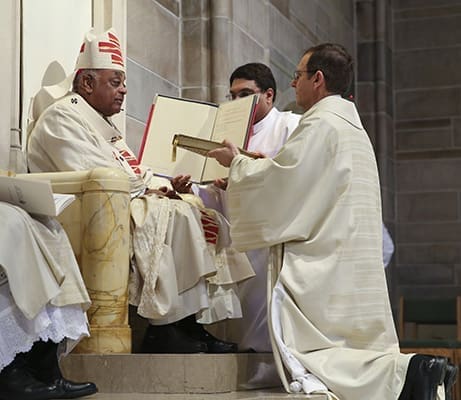
Archbishop Wilton D. Gregory presents the Book of Gospels to Deacon Thomas Nemchik. Deacon Nemchik is assigned to serve at St. Philip Benizi Church in Jonesboro. Photo By Michael Alexander
“If you asked, he was there. He was a very good leader, even to us adults,” she said. “He is humble and direct in helping you to seek what you are trying to find.”
Attending the ordination was important to her.
“I would have gone to Alaska if it was there, for sure. Absolutely,” said Roman.
David Sevilla watched his father, Guillermo “Hedy” Sevilla, be ordained. The 30-year-old attends All Saints Church, Dunwoody.
“He’s a very devout Christian, father, husband. He’s definitely the rock of the family,” Sevilla said about his dad.
As a young man, his father attended seminary in his native Philippines. Sevilla said his father’s pursuit of the diaconate years later was not a surprise.
“I knew he was always headed that way,” said Sevilla
The younger Sevilla said he felt his father’s history as an immigrant would help build links to others and add to the diversity of the community.
Sevilla described his father as patient and also determined. He recalled his father during studies for the diaconate staying up until 1 a.m. before going to bed to rest a bit before his work as an accountant.
“Whatever he sets his mind to, that’s what he’ll do,” he said.
A task for many hands
Shannon Zieg, the parish administrator at St. Mary, Mother of God Church, Jackson, said parish members have been getting to know Deacon Steve Gross, who travels to the small parish some 50 miles south of Atlanta. Zieg said she’s seen the deacon has a gift to “talk to people, listen to them, and get the message of Jesus out.”
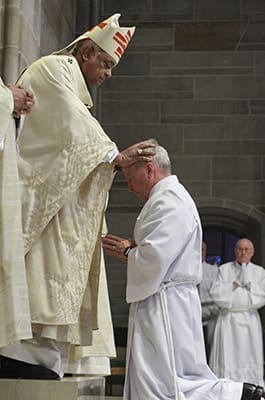
Archbishop Wilton D. Gregory lays hands upon permanent diaconate ordination candidate Stephen Gross, from St. Mary, Mother of God Church, Jackson. Photo By Michael Alexander
In the rich tradition of the rite of ordination, the men promised obedience to the archbishop and prostrated themselves face down on the marble floor of the cathedral as the congregation prayed for them.
Later, Archbishop Gregory placed his hands upon them and prayed and consecrated them as deacons. Soon after, the men were vested with a stole that drapes diagonally across the chest and a dalmatic, the vestment worn during liturgies.
In his homily, Archbishop Gregory said, “Serving God’s people has always been a task that takes many hands.”
Deacons were part of the early Christian community, he said, with a ministry that was “both a necessity and a grace.” Since its earliest history, charity was the focus of the diaconate’s efforts.
“Deacons are servant ministers in the very image of Christ Jesus,” said the archbishop.
He thanked the deacons’ wives and children for their role in supporting the men’s vocations and called them an “indispensable component” of the ministry.
He said the deacons must see prayer as a vital part of the ministry, which will shape the rest of their efforts, from serving people in need to serving at the altar.
In their work as deacons, the archbishop said the men must not allow that “people’s hungers go unnoticed, their nakedness go unattended and their sorrows go unconsoled.”
